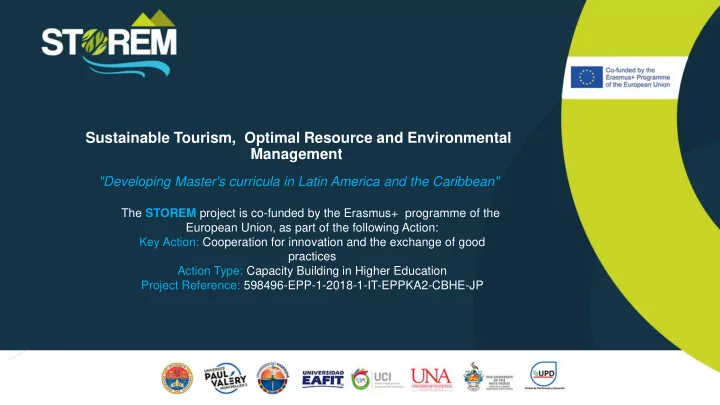

Sustainable Tourism, Optimal Resource and Environmental Management "Developing Master's curricula in Latin America and the Caribbean" The STOREM project is co-funded by the Erasmus+ programme of the European Union, as part of the following Action: Key Action: Cooperation for innovation and the exchange of good practices Action Type: Capacity Building in Higher Education Project Reference: 598496-EPP-1-2018-1-IT-EPPKA2-CBHE-JP
The STOREM Project aims to implement new master’s curricula in 5 higher education institutions in the Latin American and Caribbean region (Barbados, Colombia, Costa Rica) in the field of sustainable tourism and environmental management
Participating Institutions Università degli Studi di Cagliari (ITALIA) Department of Economic and Business Sciences Université Paul Valery Montpellier (FRANCE) Department of Geography and Planning
Participating Institutions University of the West Indies (BARBADOS) Centre for Resource Management and Environmental Studies Universidad para la Cooperación Internacional (COSTA RICA) Faculty of Environment and Development Universidad Nacional (COSTA RICA) Mesoamerican Center of Development
Participating Institutions Universidad del Magdalena (COLOMBIA) International Relations Office Universidad EAFIT (COLOMBIA) Department of Earth Sciences Unidad de Planificación y Desarrollo (COLOMBIA)
General Objective To implement new Master’s curricula in 5 higher education institutions in the Latin American and Caribbean region (Barbados, Colombia, Costa Rica) in the field of sustainable tourism and environmental management.
Specific Objectives 1. To design and develop two new Master’s degree curricula and a set of new courses in cooperation with higher education institutions in partner countries.
Specific Objectives 2. To develop a model of interaction between higher education institutions and private and public actors.
Specific Objectives 3. To establish Observatories on Sustainable Tourism and Environmental Protection at higher education institutions in partner countries, which will be used for teaching, research, policy evaluation and in order to keep high the level of awareness on the issues of sustainability.
Specific Objectives 4. To strengthen the peace process by promoting higher education and labor market inclusion opportunities for internally displaced populations in the new Master’s degree curricula, as well as to build local capacities through training activities and support inter and intra community dialogue.
Project Methodology Preparation • Review of current curricula and practices in the EU and the Caribbean • Assessment of environmental issues and existing policies in Caribbean partner countries • Analysis of current training paths and needs in Caribbean partner countries • Development of an approach to integrate IDP students in Colombian HEI programs
Project Methodology Development • Design of curriculum and courses of the STOREM pathway • Process of national approval for new Master’s programs • Setting-up E-Learning platforms for online information, tools and resources at HEIs • Building University - Enterprise - Local Administration partnerships • Establishing observatories on sustainable tourism and environmental protection at HEIs
Project Methodology Quality Control and Monitoring • Definition of a quality framework • Implementation of quality assurance control processes • Generation of project quality reports
Project Methodology Dissemination and Exploitation • Development of a dissemination strategy • Construction of a project website • Production of public outreach materials
Project Methodology Management • Coordination of meetings • Formation of the project management commit • Set -up of an online document collaboration environment • Financial administration
Contact Us Project Coordinator Project Manager Anna Maria Pinna Paola Pinna ampinna@unica.it papinna@gmail.com www.storem-erasmus-cbhe.com Facebook : storemerasmus Instagram : storemproject
Recommend
More recommend